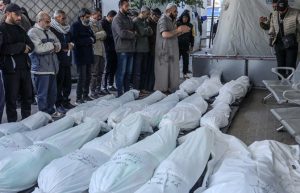Aid trucks at Rafah wait for green light to enter Gaza as ceasefire begins
3 min readAs the ceasefire between Israel and Hamas took effect on Sunday, Egypt announced plans to open its Rafah border crossing with Gaza to allow the flow of humanitarian aid into the besieged territory. This crossing is the primary gateway between Gaza and the outside world but had remained closed since May of the previous year, following Israeli military actions that took control of the Palestinian side.
During a news conference with his Nigerian counterpart, Egyptian Foreign Minister Badr Abdelatty emphasized Cairo’s efforts to bring substantial humanitarian assistance into Gaza. “We have agreed on allowing 600 trucks daily inside the Strip, including 50 fuel trucks. We hope that 300 trucks go to the north, where the situation is much worse than in other areas of Gaza,” he said, outlining the scale of aid Egypt intends to send.
Discussions between Egyptian and Israeli officials had taken place earlier, with an Israeli delegation from the military and the Shin Bet internal security agency visiting Cairo on Friday to discuss the reopening of the Rafah crossing. Since then, hundreds of trucks loaded with food, water, medicine, and other essential supplies have lined up on the Egyptian side of the border, awaiting the green light to enter Gaza.
The situation inside Gaza has reached catastrophic levels, with millions of Palestinians facing extreme shortages of basic supplies due to the Israeli blockade. “The most important now, in addition to the sustainability of the ceasefire, is to address the disastrous humanitarian situation inside the Gaza Strip,” Abdelatty added, stressing the urgency of providing life-saving assistance to the civilian population.
The ceasefire, which has paused the fighting after 15 months of intense conflict, was delayed by just over two hours on Sunday as Israel awaited the release of three hostages, who were expected to be freed later that day. The ceasefire agreement also includes the release of numerous hostages held by Hamas in Gaza and hundreds of Palestinians imprisoned by Israel.
Egypt has long been a crucial mediator in the Israeli-Palestinian conflict, given its peace agreement with Israel and its shared border with the Hamas-ruled Gaza Strip. Egypt’s involvement has been vital in facilitating negotiations and maintaining dialogue between the warring parties, playing a central role in the ongoing ceasefire discussions.
In addition to providing aid, Egypt’s efforts to ensure the continuation of the ceasefire and improve the dire humanitarian conditions in Gaza highlight the broader geopolitical role the country plays in the region. While Egypt has consistently worked to mediate between Israel and Hamas, its involvement in the current crisis underscores the increasing importance of international cooperation to address both the immediate needs of the people in Gaza and the long-term stability of the region.
As the trucks wait at the Rafah border, the hope is that this humanitarian aid will alleviate some of the suffering in Gaza, providing relief to the millions of people who have endured months of shortages and deprivation. The effectiveness of this aid delivery will be closely watched, as it represents a critical lifeline for a population caught in the midst of a prolonged and devastating conflict.
The challenges, however, remain immense. With the humanitarian situation continuing to deteriorate, Egypt’s ongoing mediation efforts and its push to bring in vital supplies offer a glimmer of hope that the ceasefire could lead to a more stable and peaceful resolution, even if only temporarily. The coming days will reveal whether the flow of aid can be sustained and whether this ceasefire can mark the beginning of a longer-term cessation of hostilities in the region.







